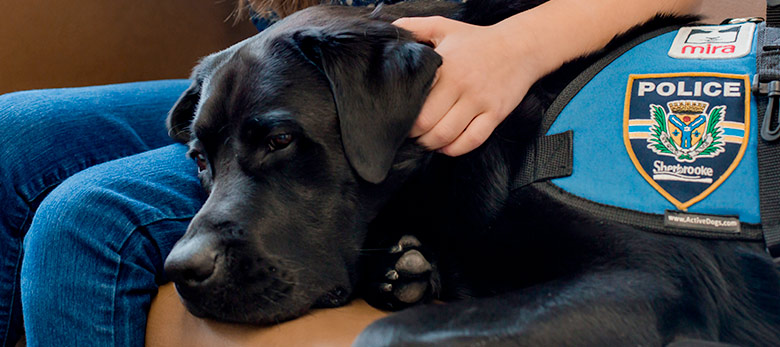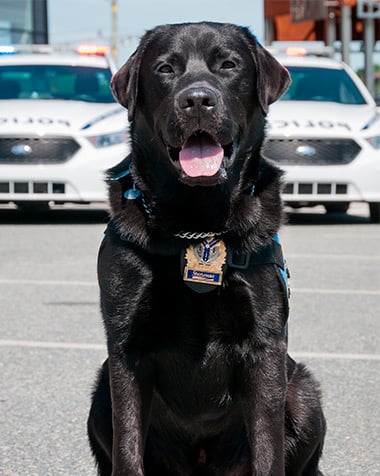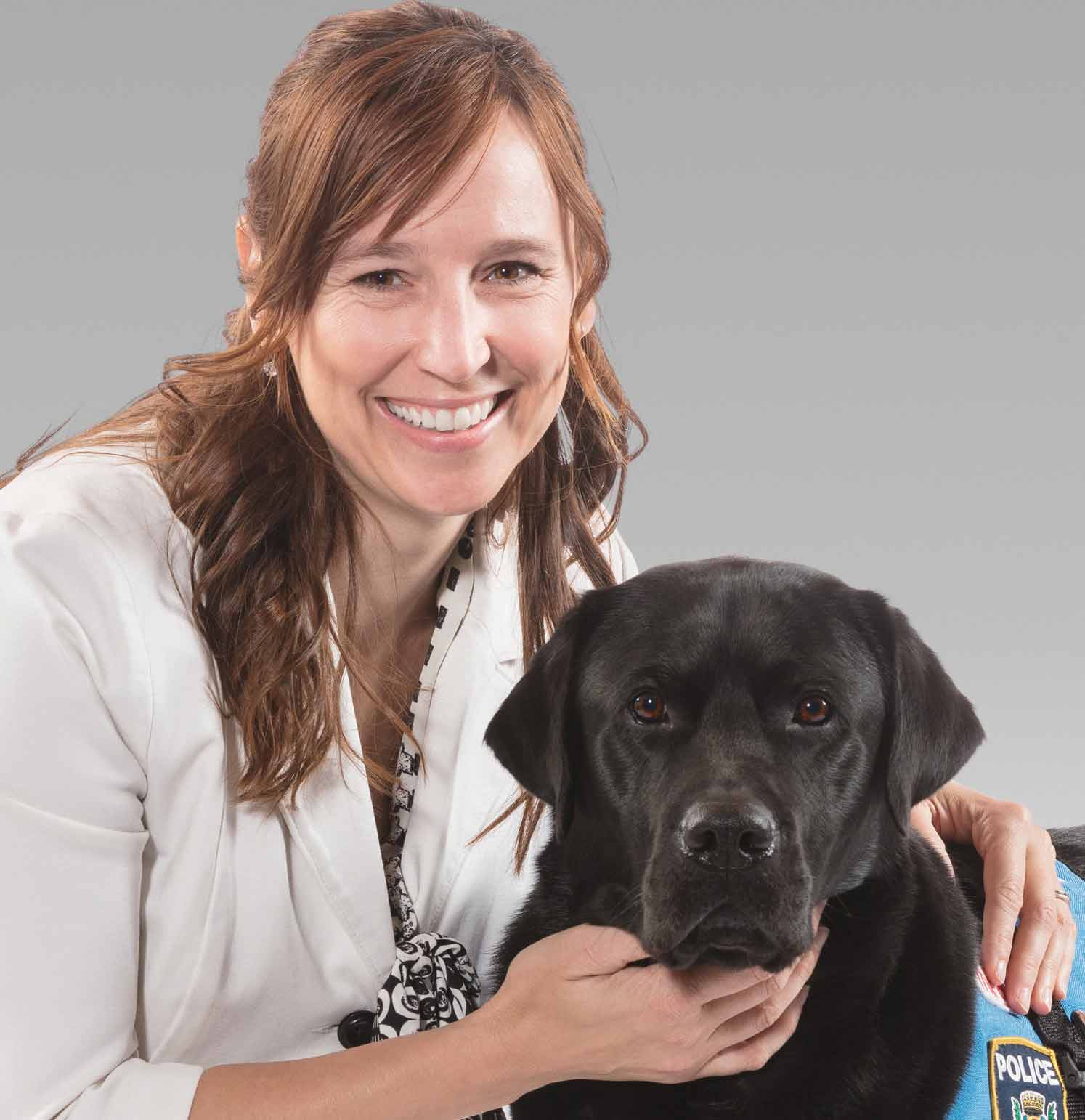
Meet Kanak: The emotional support dog
Published October 29, 2018.

Mondou Academy
Mondou employee training specialist
Did you know that an investigator at the City of Sherbrooke police department came up with the idea of introducing the first emotional support dog in Quebec? Meet Kanak, the Labrador, and his handler, Mélanie Bédard, whose idea has had a significant impact on the lives of the people in her community.
Where did you get the idea for an emotional support dog?
Kanak and I crossed paths following a series of small coincidences. First, in summer 2015, I came across an article about a seven-year-old girl who testified against her father who had sexually abused her. In order to comfort her and help her feel safe during her court testimony, she was accompanied by a support dog named Hawk, from the Calgary policy department. Being a total animal lover, I said: “Wow! What a great idea!”
A few weeks later, my neighbour Audrée lent me a few books, including The Why Café and Return to the Why Café by John P. Strelecky. After reading these books, I realized that I was missing some passion in my life. I told myself that if I were passionate about my work, it wouldn’t feel like work. So, I started looking around for something that would inspire me and that I could feel passionate about.
A few months later, my family and I finally moved forward with our project to adopt a puppy, which our children named Charlie. Whenever they were sad or hurt, they would turn to Charlie. No matter how much we tried to console them, they would go right past us to the dog.

I started asking myself why my kids tended to look to the dog for comfort when we, their loving parents, were there to watch over them. I discussed the situation with my husband, who is also a police officer. We went a step further in our thinking, reflecting on the comfort needs of a child from a disadvantaged background whose parents are alcoholics or drug addicts.
A child who has been abandoned, neglected or psychologically, physically or sexually abused is required to meet with an unknown investigator and provide a detailed description of the abuse that he or she has suffered. The child has to answer difficult questions that evoke painful memories and feelings of shame, fear and guilt.
Moreover, the child must do so alone because, when we meet victims for an interview, they are not accompanied by a parent or a support person to avoid having their answers influenced by that person. The child must have a tremendous need for comfort at that time. That’s when it occurred to me that a dog could play a key role.
I did some online research and came across the Courthouse Dogs Foundation, which institutionalized the use of support dogs in 2003.
I did some background reading and contacted some Canadian dog handlers. Then, I asked to meet with the police department executive to present my project, which was quickly accepted. On January 10, 2016, I finally decided to launch my project.

How did you choose Kanak?
In order to find a calm, low-energy dog that was not prone to react and that liked children, I called on the Mira Foundation. At the end of May 2016, they had a dog for me, and I was able to receive my training with the foundation. When I began working with Kanak, I fell in love immediately! He was very docile and beautiful, and seemed to be the easiest-going of the group. He gazed at me intently and had that special something.
I worked with the other dogs, but I kept coming back to Kanak. When we officially received our dogs, I was assigned Kanak, and I was thrilled. The foundation staff was happy that I had fallen for Kanak because he was selected as Mira’s first support dog.
What’s the difference between an emotional support dog and a therapy dog?
It is important to distinguish between support dogs and therapy animals. Support dogs are certified by Assistance Dogs International (ADI) or by the International Guide Dog Federation (IGDF). The only Quebec organization recognized for meeting the highest international standards is the Mira Foundation. Animal therapists, who are trained in animal mediation, select and train their dog, and team up with a professional or an organization, which hires them for their customers. Professionals with support dogs are with their dog 24 hours a day and include the dog in any dealings with their clientele.
The term “support dog” was created by the federal Department of Justice and refers to dogs used to accompany crime victims. These dogs provide victims and their families with emotional support, help police officers and prosecutors in their work, and support witnesses who are testifying. However, my personal definition of a support dog is more general, since dogs can provide support in a number of other areas.
How is Kanak different from other dogs?
First, he is certified by a dog school (Mira Foundation) that is recognized by the IGDF, Anima Québec and ADI. He spent a year with a host family to become more sociable. Then, he went through a series of tests before receiving training at the Mira Foundation. He is therefore a “professional” working dog. He is not a family pet trained as a support dog. He was chosen for his temperament and his ability to be happy and effective in the performance of his duties.
Moreover, although Labradors are very active by nature, Kanak is very calm and almost nonchalant. He naturally adores children and is not at all aggressive. He can spend hours completely still alongside the victim. He does not cause any distractions or interfere with court proceedings. Kanak is an exceptional dog and is exactly what was needed to ensure the project’s success.

Entrevue avec Mélanie Bédard,
sergente-détective du service de police de Sherbrooke.
Interview with Mélanie Bédard,
detective from du Sherbrooke Police.